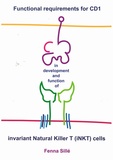Functional requirements for CD1 in development and function of invariant Natural Killer T (iNKT) cells
Summary
Activation of the adaptive immune response primarily depends on the presentation of peptide antigens via Class I and II major histocompatibility (MHC) complexes. However, some pathogens and tumor cells have evolved evasive mechanisms to escape these ‘conventional routes’ of antigen presentation. The research described in this thesis focuses on the ‘alternative route’ of lipid antigen presentation on CD1d molecules for the development of invariant Natural Killer T (iNKT) cells and their activation during pathogenic and autoimmune diseases.
Activated iNKT cells represent highly potent immunoregulatory cells, stimulating both innate and adaptive immune responses, which makes them attractive targets for immunotherapy. It is therefore, important to understand the mechanisms behind the development and activation of iNKT cells.
Thymic selection and peripheral maturation of iNKT cells in mice requires CD1d presentation of antigen acquired in endosomal compartments. CD1d molecules reach these compartments through their intrinsic tyrosine motif and by association with the Class II MHC chaperone, invariant chain (Ii). Using a new mouse model in which all CD1d is replaced by CD1d-enhanced yellow fluorescent fusion protein (EYFP), we clarified that the CD1d-encoded tyrosine motif influences the thymic selection of iNKT cells, but is dispensable for their peripheral maturation. In combination with mouse models deficient for Ii or the Ii-processing enzyme cathepsin S (CatS), we showed that both the CD1d-encoded and Ii-encoded endosomal sorting motifs are necessary for peripheral activation of iNKT cells and that thymic selection of iNKT cells not only occurs on CD4+CD8+ thymocytes but also on Ii and CatS-expressing cells. Patients with deletions or mutations in the CD1d tyrosine motif, invariant chain, or accessory molecules that interact with the cytosolic tail of CD1d, could therefore display severe iNKT cell deficiencies and susceptibility to certain pathogen infections.
Invariant NKT cells play a role in the early immune response against Mycobacterium tuberculosis (Mtb) by suppressing intracellular bacterial growth when activated by antigenic.
